Should I Feed Fish One or Twice a Day
Like grazing mammals and birds that eat all day long, whenever they can find food, fish by nature are also opportunist eaters that eat whatever they can get. However, pet fish living in an aquarium can manage with eating only twice a day – in the early morning and around sunset.
In the wild, fish are constantly on the hunt for food and will eat as much as possible in one meal when they find something that suits their taste buds. On the other hand, if a fish can't find anything edible to fill their stomachs, they can go without eating for at least a week without eating. And healthy adult fish won't die of starvation until they have been for five or six weeks without food.
This means that if you have pet fish and go away for a weekend, you don't have to worry that there is nobody to feed them. On the other hand, you never want your fish to be stressed over the fact that they are hungry and unable to find food for themselves.
How Much Should I Feed my Fish?
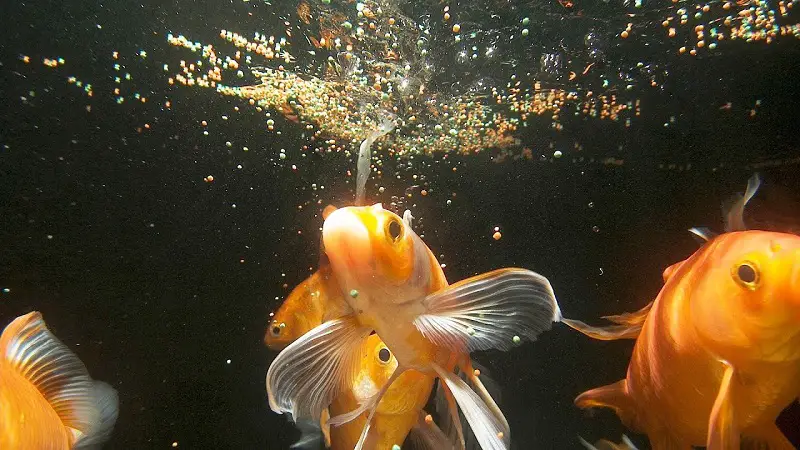
While many animals collect and save food for future use, fish cannot store their food and need to find fresh sources of nutrition every day. The best practice for people who keep fish as pets is to research the type of food your fish needs and follow directions on the packaging regarding how much to feed them.
Since by nature they are scavengers, your fish will learn that when you approach there is a chance of getting something to eat. They may start swimming frantically and rising to the surface of the water with their mouths open. At such an endearing spectacle, you may be inclined to think, "Poor fish! Look how hungry they are! I'll give them a little extra today." And there is nothing more satisfying than watching any pet gobble up the food you give them. It gives you a real sense of purpose and responsibility.
However, fish will also gorge themselves unnecessarily and make themselves sick. While they will always eat if food is offered, healthy fish should know to stop eating when they are full. However, there are always those fish that don't understand that too much of a good thing can be bad…. Another problem with overfeeding is that the food they don't eat clan break down into toxins that are dangerous to the fish or clog the tank's filter.
It should take your fish about 5 minutes to finish their meals. If they finish all the food in a minute, perhaps they need more food. If they continue eating for longer than five minutes, or if you see leftover food still floating on the water's surface or slowly sinking to the bottom of the tank after a feeding, you might be giving the fish larger portions of food than they need.
How Often Should I Feed my Fish?
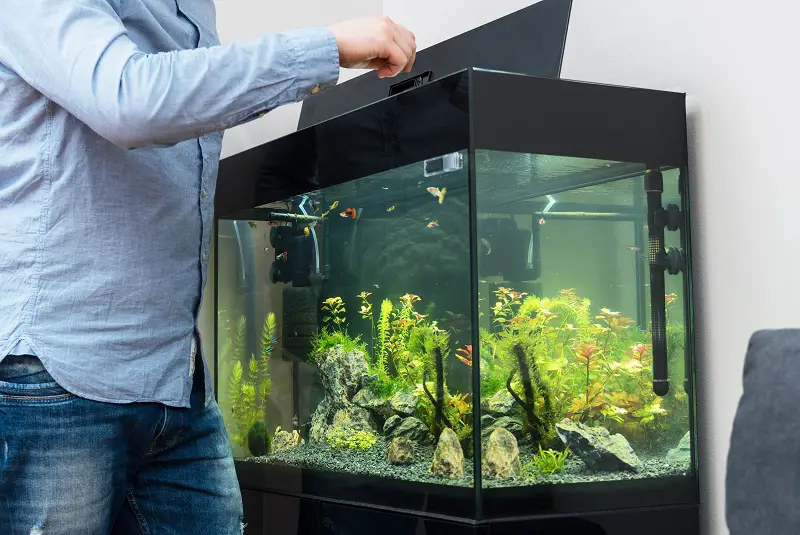
The times and frequency that you feed your fish depend entirely on the type of fish you have, with the basic rule being one feeding a day.
If you really enjoy watching your fish eat, you can halve the recommended portion and feed them twice a day.
There can be many exceptions to this rule.
- Newly hatched and young fish will need to eat at least three times a day because they are still growing. You will still need to feed them a controlled amount of food, but simply divide it into very small portions.
- Herbivore (plant-eating) fish have smaller stomachs than meat-eating fish, and also need to eat more frequently. Fish like Farowellas, Mollies, and Silver Dollars would be grazing in the wild, and need the opportunity to "graze" in your tank.
- Goldfish, believe it or not, don't have stomachs. They digest their food in their intestines. They too need to eat two or more small meals per day to get the nutrients they need.
- Most fish will be happy eating either early in the morning or at sunset. Meaning, before you go to work or after you get home. But nocturnal fish only eat at night, and so should be fed just before you turn off all the lights in your home to go to sleep. Nocturnal fish are able and happy to search for and eat their food in the dark. You just won't have the pleasure of watching them eat unless you stay up late yourself!
How do I know if my Fish are Hungry?
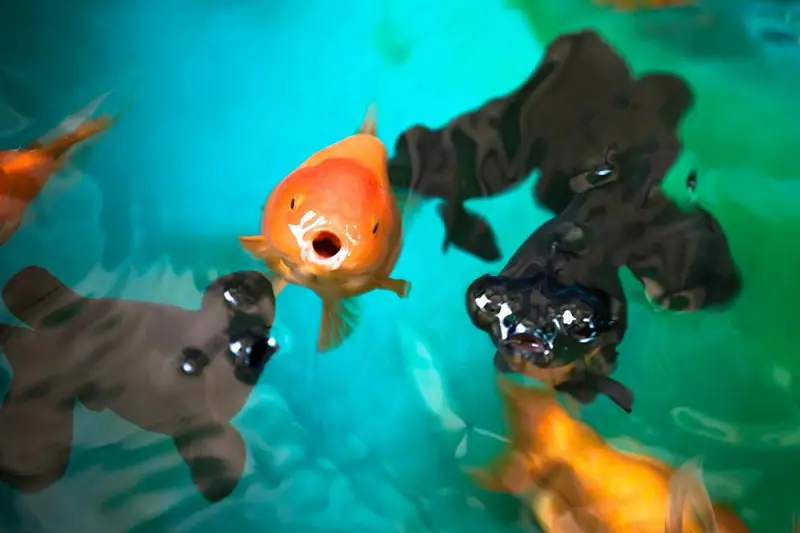
Sometimes you think your fish are hungry because when they catch sight of you near the aquarium they started swimming frantically in circles and poking their open mouths out of the water. But that is similar behavior to a dog that jumps on you wagging his tail after not seeing you for a mere ten minutes (never mind that he had a long walk, you played fetch with him, and he ate…)
While wild fish can go a day or two without eating, fish kept as pets will get accustomed to a regular feeding schedule and will therefore feel hungry if they miss a meal. On the other hand, it's healthier for your fish to always be a little hungry than to always be "stuffed to the gills" as the expression says.
Signs that a fish is truly hungry include aggression towards other fish in the tank, digging at the bottom of the tank, slow or sluggish activity, and a clear decrease in size or weight.
Preventing Problems Caused by Overfeeding
Test the aquarium water every few days to make sure there is no buildup of bacteria, nitrates, and ammonia. If the levels of harmful chemicals and pollutants in the water get too high, change the water and decrease the amount of food you are feeding your fish.
Buy an automatic fish feeder so you don't have to keep worrying about whether or not your fish are getting the right amounts of food at the right time.
Add some live plants to your aquarium. The fish can nibble on the plants between meals if they get hungry, and the plants will remove carbon monoxide from the water and add oxygen.
To make sure all your fish get a fair amount of food, sprinkle the food across the surface of the water rather than dropping it all in one spot. You may notice that some of your fish are pushy and don't leave food for the others. Be patient – once a fish gets full, he will move away and let his tank mates eat their share.
Once a week feed your fish live supplements such as bloodworms, micro worms, white worms, and Daphnia (water fleas).
If you have time, remove leftover food when your fish finish a meal. You can use a substrate siphon or let your filter do the work, but that will mean spending extra time cleaning the filter.
If you are a forgetful type of person, and can never remember if you already fed your fish on any given day, make a chart with the days of the week and feeding time. Every time you feed your fish make a mark on the chart. That way you won't forget to feed your fish altogether or feed them double what they need.
Feeding Time Chart for Different Kinds of Fish
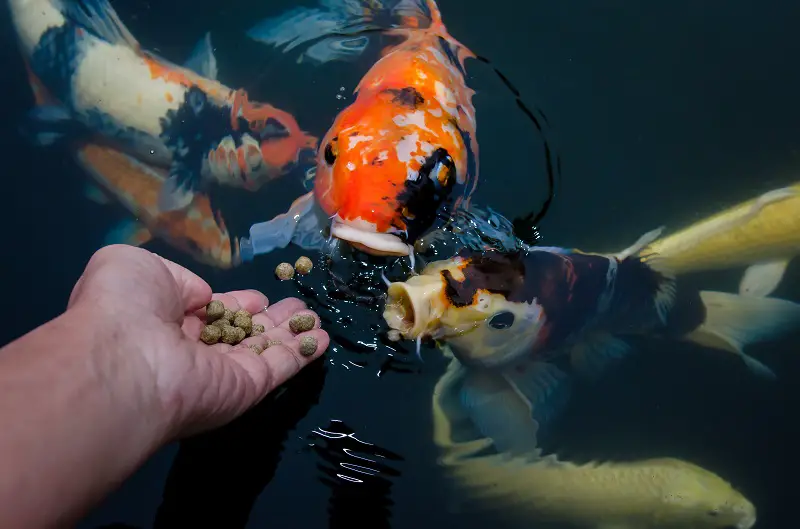
| Type of Fish | Type of Food | Number of Meals per Day | Best time to Feed |
| Goldfish | herbivores – plant-based fish flakes, algae | 2 | morning and evening |
| Rainbowfish | omnivores – fish flakes, fresh vegetables, and live meat food is preferred to processed food (mosquito larvae, water fleas, brine shrimp, earthworms) | 2-3 | morning, noon, and evening |
| Angelfish | carnivores – natural foods such as bloodworms, shrimp, and water fleas (*in the wild they eat sponges, replace with spirulina) | 2-3 | morning, noon, and evening |
| Guppies | omnivores – fish flakes, blood worms, brine shrimp, veggie pellets, beef heart, egg yolks, vegetable paste, soft fruit (bananas and grapes) | 1-2 | morning and/or afternoon (*guppies cannot see in the dark and won't be able to find their food at night) |
| Mollies | omnivores – high-quality fish flakes, blackworms, bloodworms, brine shrimp, water fleas, spirulina flakes variety of vegetables(zucchini, cucumber, shelled peas, chopped and boiled spinach | 1-2 | morning and/or evening |
| Neon Tetra | omnivores – fish flakes, live white worms, frozen bloodworms, brine shrimp, aquarium plants, and algae. | 2-3 | morning, noon, and evening |
| Zebra Danios | omnivores – fish flakes, water fleas, small worms and insects, live or frozen brine shrimp, fresh vegetables (such as lettuce), algae | 2-3 | morning, noon, and evening |
| Siamese Fighting Fish (Betta) | carnivores – live or frozen plankton, water fleas, glass worms, brine shrimp, beef heart, tubifex (always thaw frozen food before feeding to fish) | 2 (remove any leftover food after two minutes of eating) | morning and evening |
| Koi – only babies up to two years, after which they must be moved to outdoor ponds | omnivores – special food for Koi fish, plants in the aquarium | 4 (remove any leftover food after five minutes of eating) | Several times a day, making sure to spread the food around |
Source: https://www.fishkeepingworld.com/fish-feeding-times/
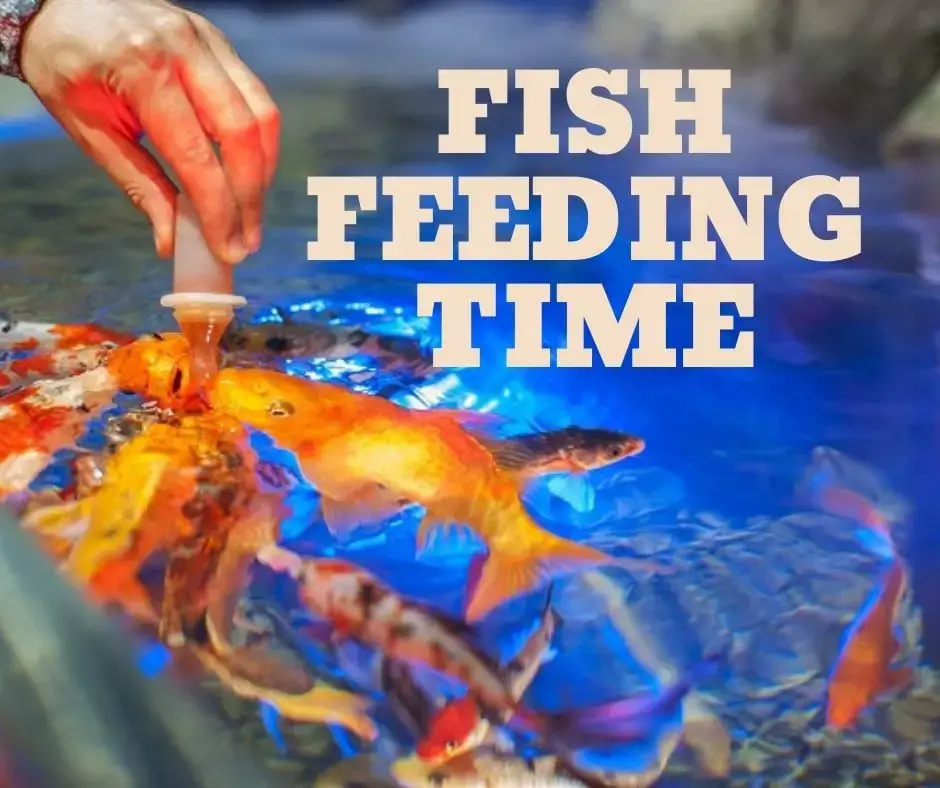
0 Response to "Should I Feed Fish One or Twice a Day"
إرسال تعليق